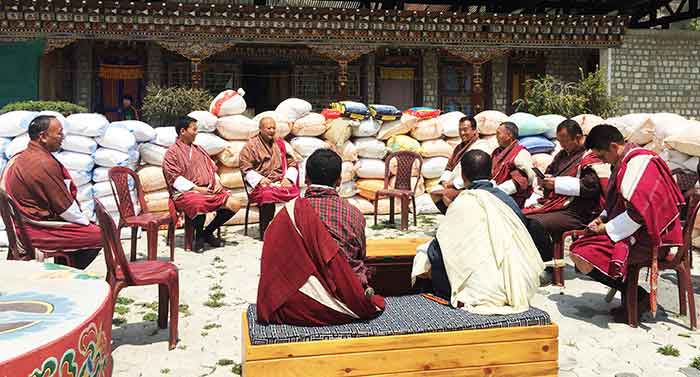Villagers donated anything from salt to cooking oil to zaw
Phub Dem | Paro
With most villagers cultivating paddy and the place known as the ‘rice bowl’ of the country, farmers from Paro contributed 25 tonnes of rice to His Majesty’s Secretariat. They also contributed about Nu 1.5 million (M) to His Majesty’s Kidu Fund for Covid-19.
Farmers also contributed butter, cheese, salt, oil, asparagus, turnips, red chilli, and puffed rice (zaw).

Ten gewogs of Paro contributed tones of red rice
Local leaders of 10 gewogs of Dotey, Lamgong, Dopshari, Wangcha, Luni, Shaba, Tsento, Naja, Dogar and Hungrel handed over the goods to Zimpoen yesterday in Paro.
Dopshari gup, who is the dzongkhag tshogdu chairperson, Tshering Dorji, said villagers contributed everything that was available as a little contribution at this critical time.
“It was the right time to shoulder equal responsibility rather than depending on government and His Majesty always,” he said.
The gup said villagers came forward to contribute acknowledging what His Majesty was doing for the country and people at this critical time. “Villagers approached gewogs to direct them on how and where to contribute if gewogs wasn’t initiating the contribution.”
After many villagers approached the gups, he said that the gewogs then decided to lead the voluntary initiative of the people.
The contribution was solely based on what the villagers could afford. “Those who did not cultivate rice contributed imported rice and others contributed cash ranging from Nu 5 to Nu 5,000,” gup Tshering Dorji said.
He said although villagers cultivate abundant cereals, the local leaders advocated on keeping stock for one’s family first and then decide about contributing.
A villager, Damche, 60, said she would contribute vegetables and fruits in a few months. “Right now we only have rice and dried vegetables. We are contributing what we have and we will continue to do this.”
She said that it was time to repay for all the free services the government and His Majesty had provided to the people.
Gup Tshering Dorji said that although gewogs including Dogar, Naja, Hungrel and Tsento do not cultivate abundant rice due to rugged terrain, they contributed imported rice and that the gewogs have enough rice to last for a year.
The local leaders also assured that majority of villagers had enough stock to sustain themselves if the situation worsen. “In a few months, the farmers will start paddy cultivation. There won’t be any shortages.”
The perishable goods such as butter, cheese, chillies, and vegetables will be sent to Phuentsholing for those Bhutanese who shifted from Jaigon recently.
Meanwhile, 10 gups and thromde thuemi of Paro also contributed their month’s salary to the government’s Covid-19 relief fund last month. The contribution was about Nu 300,000.


